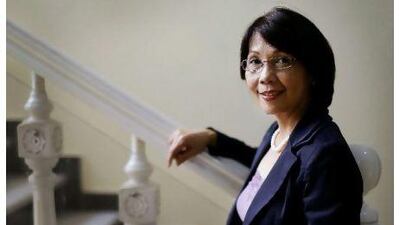ABU DHABI // When housemaids leave their jobs and seek shelter at the Filipino Workers Resource Centre, Ophelia Almenario is one of the staff who feel the force of their employers' anger.
The Filipina welfare officer took a call one morning at the shelter, at the Philippine embassy and labour offices in Al Bateen, from a woman claiming that her housemaid had no reason to leave.
"It's so depressing," Mrs Almenario says. "She asked me why we were encouraging our housemaids to run away and keep them here."
She explained to the caller that the embassy does not encourage housemaids to abscond. However, many arrive never having worked as housemaids in the Philippines, she says.
"Many complain of overwork, lack of sleep and non-payment of salaries," she says. "It's our job to help workers who seek our help, we can't turn them away."
Mrs Almenario holds three degrees - in medical technology, accounting and law - from the Philippines.
"My mother wanted me to work overseas so she encouraged me to study medical technology in college," she says.
She graduated in 1975 but chose to remain in the Philippines, working as a medical technologist and later as a researcher. She studied accounting between 1983 and 1987 and passed the board exams a year later.
"My husband, an economist whom I married in 1978, wanted us to set up a private consultancy office," she said. "It didn't materialise but it's still my dream that I'd like to fulfill."
Between 1987 and 1999 she worked as an accountant for the Department of Energy and Natural Resources and the Overseas Workers Welfare Administration (OWWA) regional office in Leyte, her home town. She studied law in her spare time, and passed the bar exams in 1998.
Before moving to Abu Dhabi in October 2009, Mrs Almenario worked as a legal officer and overseas workers welfare officer at the OWWA in Manila.
She handled case resolutions and represented the OWWA at the Philippine senate when it deliberated laws affecting overseas Filipino workers, particularly the Migrant Workers' Act, which she said needed some fine-tuning after it was passed in 1995.
The move to Abu Dhabi meant leaving behind her four daughters and son, aged between 17 and 30, in the care of her husband. In the beginning, the distance was hard to bear.
"When I arrived here I was homesick and got so affected by employers raising their voice and housemaids sobbing in front of me," she says.
"Now it doesn't affect me that much. I tend to be more in control of my emotions. In a way, I've become stronger."
In her spare time Mrs Almenario occasionally loves to trawl the capital's malls for some retail therapy. Most weekends, however, she prefers to stay at home to listen to country and pop music on her laptop.
"I've got more than a thousand music files here," she said. "I own an iPod but don't get to use it."
Oliva Macawili, the co-ordinator of the Filipino Workers Resource Centre in Abu Dhabi, describes Mrs Almenario as "firm but fair", someone who listens carefully to all sides before proceeding.
During Mrs Almenario's time in Abu Dhabi, which ends next October, the number of housemaids at the women's shelter has dropped from a high of 200 in the first quarter of 2010 to fewer than 100.
More work needs to be done in the Philippines, however, to ensure a continuous flow of new housemaids who are better prepared for what they may encounter in the UAE.
"What is badly needed is a proper dissemination of information for workers at the pre-deployment stage," she says.

